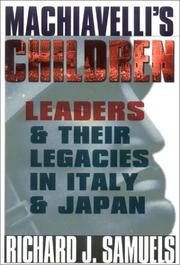| Listing 1 - 3 of 3 |
Sort by
|
Book
ISBN: 9781898823827 9781898823810 1898823820 1898823812 Year: 2018 Publisher: Folkestone Renaissance Books
Abstract | Keywords | Export | Availability | Bookmark
 Loading...
Loading...Choose an application
- Reference Manager
- EndNote
- RefWorks (Direct export to RefWorks)
"This book offers an account of the life of Shibusawa Eiichi, who may be considered the first 'internationalist' in modern Japan, written by his great grandson Masahide and published in 1970 under the title, Taiheiyo ni kakeru hashi (Building Bridges Over the Pacific). Japan had a tortuous relationship with internationalism between 1840, when Shibusawa was born, and 1931, the year the nation invaded Manchuria and when he passed away. The key to understanding Shibusawa's thoughts against the background of this history, the author shows, lies in the concept of 'people's diplomacy,' namely an approach to international relations through non-governmental connections. Such connections entail more transnational than international relations. In that sense, Shibusawa was more a transnationalist than an internationalist thinker. Internationalism presupposes the prior existence of sovereign states among which they cooperate to establish a peaceful order. The best examples are the League of Nations and the United Nations. Transnationalism, in contrast, goes beyond the framework of sovereign nations and promotes connections among individuals and non-governmental organizations. It could be called "globalism" in the sense that transnationalism aims at building bridges across the globe apart from independent nation-states. In that sense Shibusawa was a pioneering globalist. It was only in the 1990s that expressions like globalism and globalization came to be widely used. This was more than sixty years after Shibusawa Eiichi's death, which suggests how pioneering his thoughts were." [Akira Iriye]
Capitalists and financiers --- Shibusawa, Eiichi, --- Japan --- United States --- Foreign relations
Book
ISBN: 1898823820 1898823812 Year: 2018 Publisher: Folkestone : Renaissance Books,
Abstract | Keywords | Export | Availability | Bookmark
 Loading...
Loading...Choose an application
- Reference Manager
- EndNote
- RefWorks (Direct export to RefWorks)
"This book offers an account of the life of Shibusawa Eiichi, who may be considered the first 'internationalist' in modern Japan, written by his great grandson Masahide and published in 1970 under the title, Taiheiyo ni kakeru hashi (Building Bridges Over the Pacific). Japan had a tortuous relationship with internationalism between 1840, when Shibusawa was born, and 1931, the year the nation invaded Manchuria and when he passed away. The key to understanding Shibusawa's thoughts against the background of this history, the author shows, lies in the concept of 'people's diplomacy,' namely an approach to international relations through non-governmental connections. Such connections entail more transnational than international relations. In that sense, Shibusawa was more a transnationalist than an internationalist thinker. Internationalism presupposes the prior existence of sovereign states among which they cooperate to establish a peaceful order. The best examples are the League of Nations and the United Nations. Transnationalism, in contrast, goes beyond the framework of sovereign nations and promotes connections among individuals and non-governmental organizations. It could be called "globalism" in the sense that transnationalism aims at building bridges across the globe apart from independent nation-states. In that sense Shibusawa was a pioneering globalist. It was only in the 1990s that expressions like globalism and globalization came to be widely used. This was more than sixty years after Shibusawa Eiichi's death, which suggests how pioneering his thoughts were." [Akira Iriye]
Capitalists and financiers --- Shibusawa, Eiichi, --- Shibusawa, Seien, --- Eiichi, Shibusawa, --- 澁澤榮一, --- 渋澤榮一, --- 澁澤栄一, --- 澁沢榮一, --- 渋沢榮一, --- 渋澤栄一, --- 渋沢栄一, --- 澁澤榮一翁, --- 涩泽荣一, --- Japan --- United States --- Foreign relations --- Japan. --- Manchuria. --- international relations. --- internationalist. --- modern Japan. --- Shibusawa, Seien --- Eiichi, Shibusawa --- 渋澤榮一 --- 澁沢榮一 --- 渋沢榮一 --- 渋澤栄一 --- 渋沢栄一 --- 澁澤榮一翁 --- 涩泽荣一 --- 1912-1926 --- Taishō Period (Japan)

ISBN: 0801434920 9780801434921 9780801489822 0801489822 1501720309 1501720295 Year: 2003 Publisher: Ithaca Cornell university press
Abstract | Keywords | Export | Availability | Bookmark
 Loading...
Loading...Choose an application
- Reference Manager
- EndNote
- RefWorks (Direct export to RefWorks)
Two late-developing nations, Japan and Italy, similarly obsessed with achieving modernity and with joining the ranks of the great powers, have traveled parallel courses with very different national identities.
J4600.70 --- J4121 --- J2284.70 --- Political leadership --- -Political leadership --- -Leadership --- Japan: Politics and law -- history -- Kindai (1850s- ), bakumatsu, Meiji, Taishō --- Japan: Sociology and anthropology -- leadership and loyalty --- Japan: Genealogy and biography -- biographies -- kindai (1850s- ), bakumatsu, meiji, taishō --- History --- -History --- -#A0507PO --- -Japan: Politics and law -- history -- Kindai (1850s- ), bakumatsu, Meiji, Taishō --- Leadership --- #A0507PO --- Italy --- 19th century --- 20th century --- Japan --- Geschichte 1800-2000. --- Internationaler Vergleich. --- Leadership politique --- Leiderschap. --- Political leadership. --- Politische Führung. --- Rezeption. --- Histoire --- Machiavelli, Niccolò, --- Machiavelli, Niccolò. --- Chōsen Kōgei Kenkyūkai. --- 1800-1999. --- Italien. --- Italy. --- Japan. --- JP / Japan - Japon --- IT / Italy - Italië - Italie --- 92 --- Geschiedenis. --- Histoire. --- History. --- 92 Geschiedenis. --- 92 Histoire. --- 92 History. --- Geschiedenis --- Italie --- 19e siècle --- 20e siècle --- Japon --- Benso, Camillo --- Itō, Hirobumi --- Yamagata Aritomo --- Rossi, Alessandro --- Ōkubo Toshimichi --- Shibusawa Eichi --- Giolitti, Giovanni --- Hara Kei --- Mutō Sanji --- Kishi Nobusuke --- Agnelli, Giovanni --- Ayukawa Gisuke --- Mussolini, Benito --- De Gasperi, Alcide --- Yoshida Shigeru --- Fanfani, Amintore --- Occhetto, Achille --- Fuwa Tetsuzō --- Bossi, Umberto --- Berlusconi, Silvio --- Ozawa Ichirō --- Ishihara Shintarō --- Itō, Hirobumi --- Yamagata, Aritomo --- Ōkubo, Toshimichi --- Shibusawa, Eiichi --- Hara, Takashi --- Mutō, Sanji --- Kishi, Nobusuke --- Aikawa, Yoshisuke --- Yoshida, Shigeru --- Fuwa, Tetsuzō --- Ozawa, Ichirō --- Ishihara, Shintarō
| Listing 1 - 3 of 3 |
Sort by
|

 Search
Search Feedback
Feedback About UniCat
About UniCat  Help
Help News
News